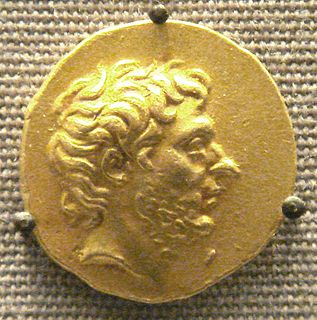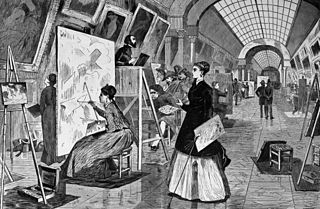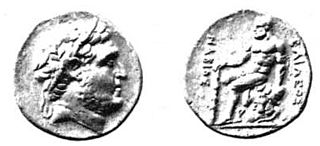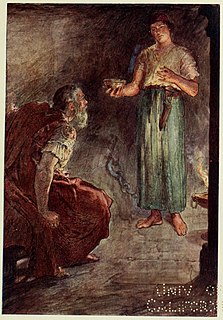Alcaeus of Messene ( /ælˈsiːəs/ ; Greek: Ἀλκαῖος ὁ Μεσσήνιος) was an ancient Greek poet, who flourished between 219 and 196 BC. Twenty-two of his short poems or epigrams survive in the Greek Anthology, from some of which his date may be fixed at around the late 3rd/early 2nd century BC. [1] Some of his poems are on literary themes, but most are political.

Greek is an independent branch of the Indo-European family of languages, native to Greece, Cyprus and other parts of the Eastern Mediterranean and the Black Sea. It has the longest documented history of any living Indo-European language, spanning more than 3000 years of written records. Its writing system has been the Greek alphabet for the major part of its history; other systems, such as Linear B and the Cypriot syllabary, were used previously. The alphabet arose from the Phoenician script and was in turn the basis of the Latin, Cyrillic, Armenian, Coptic, Gothic, and many other writing systems.
The Greeks or Hellenes are an ethnic group native to Greece, Cyprus, southern Albania, Italy, Turkey, Egypt and, to a lesser extent, other countries surrounding the Mediterranean Sea. They also form a significant diaspora, with Greek communities established around the world.

An epigram is a brief, interesting, memorable, and sometimes surprising or satirical statement. The word is derived from the Greek: ἐπίγραμμα epigramma "inscription" from ἐπιγράφειν epigraphein "to write on, to inscribe", and the literary device has been employed for over two millennia.
Contents
Alcaeus was contemporary with Philip V, king of Macedon and son of Demetrius II of Macedon, against whom several of his poems are pointed, apparently from patriotic feelings. One of these, however, gave more offense to the Roman general Flamininus than to Philip, as Alcaeus ascribed the victory of the battle of Cynoscephalae to the Aetolians as much as to the Romans. Philip contented himself with writing an epigram in reply to that of Alcaeus, in which he gave the Messenian a very broad hint of the fate he might expect if he fell into his hands. [2] This reply was enough to lead French classical scholar Claudius Salmasius to suppose that Alcaeus was actually crucified by Philip. [3] In another epigram, in praise of Flamininus, the mention of the Roman general's name, Titus, led John Tzetzes into the error of imagining the existence of an epigrammatist named Alcaeus under the emperor Titus. [4] Those epigrams of Alcaeus which bear internal evidence of their date were written between the years 219 and 196.

Philip V was king (Basileus) of the ancient Kingdom of Macedonia from 221 to 179 BC. Philip's reign was principally marked by an unsuccessful struggle with the emerging power of the Roman Republic. He would lead Macedon against Rome in the First and Second Macedonian Wars, losing both but allying with Rome in the Roman-Seleucid War towards the end of his reign.

Titus Quinctius Flamininus was a Roman politician and general instrumental in the Roman conquest of Greece.

The Battle of Cynoscephalae was an encounter battle fought in Thessaly in 197 BC between the Roman army, led by Titus Quinctius Flamininus, and the Antigonid dynasty of Macedon, led by Philip V.
Of the 22 epigrams in the Greek Anthology which bear the name of Alcaeus, two are written "Alcaeus of Mytilene"; but most scholars take this to be the addition of some ignorant copyist. Others bear the name of "Alcaeus of Messene," and some of Alcaeus alone. But in the last class there are several which must, from internal evidence, have been written by Alcaeus of Messene, and there seems no reason to doubt his being the author of all twenty-two. [1]

Alcaeus of Mytilene was a lyric poet from the Greek island of Lesbos who is credited with inventing the Alcaic stanza. He was included in the canonical list of nine lyric poets by the scholars of Hellenistic Alexandria. He was an older contemporary and an alleged lover of Sappho, with whom he may have exchanged poems. He was born into the aristocratic governing class of Mytilene, the main city of Lesbos, where he was involved in political disputes and feuds.

A copyist is a person who makes copies.







